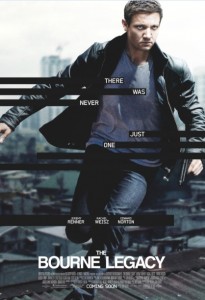 Different spy. Different program. Same evil conspiracy still trying to justify the nastiest of means with the most unprovable ends. This is “The Bourne Legacy,” the fourth in the Bourne series and the first not to star Matt Damon. Tony Gilroy, who wrote the first three films, wrote and directed this latest installment, with “Hurt Locker’s” Jeremy Renner as Aaron Cross, like Jason Bourne an inconvenient reminder of an ambitious spy program that at least some people believe needs to be shut down with extreme prejudice. Those of us who felt there was not enough Renner in the crowded Avengers movie (he was the guy with the bow and arrow) are glad to see him take the lead here. He handles it gracefully.
Different spy. Different program. Same evil conspiracy still trying to justify the nastiest of means with the most unprovable ends. This is “The Bourne Legacy,” the fourth in the Bourne series and the first not to star Matt Damon. Tony Gilroy, who wrote the first three films, wrote and directed this latest installment, with “Hurt Locker’s” Jeremy Renner as Aaron Cross, like Jason Bourne an inconvenient reminder of an ambitious spy program that at least some people believe needs to be shut down with extreme prejudice. Those of us who felt there was not enough Renner in the crowded Avengers movie (he was the guy with the bow and arrow) are glad to see him take the lead here. He handles it gracefully.
The way he walks, runs, and punches is as important to defining the character as what he says, and Renner moves with an athlete’s economy, precision, and confidence. We first see Cross in an isolated, frozen location (the settings, even more than usual, really tell the story) and we immediately learn that he is brave, resourceful, and very capable. And that he takes some sort of pills. Soon he meets up with another guy (the always-outstanding Oscar Isaac) and even though they have never met, they communicate with the kind of shorthand that lets us know they recognize they share the same training and perhaps more and yet do not entirely trust one another. Soon we find that the same people who wanted to shut down any record of Jason Bourne’s Treadstone project are trying to erase any evidence of Cross’s project, Outcome and they will do anything to make that happen.
Jason Bourne could not remember who he was or how he came to be injured and floating in the water, and we shared his discovery of his own history and growing realization of the corruption and betrayal around him. So it seems logical that Gilroy would go in the opposite direction with Aaron Cross. His problem is not a loss of memory. In a way, he has too much memory. Slight spoiler alert here, though it is revealed in the trailer — the operatives in the Outcome project have been physically and intellectually enhanced with medication monitored by scientists, including Dr. Marta Shearing (Rachel Weisz, who can carry off the brainy beauty role). Cross does not need to find out who he is. He needs to stay who he has become. When he runs out of the medication, he has to have her help to get him more.
One of the highlights of the film takes place in Marta’s home, a huge house in the country with beautiful lines and a great deal of potential but a shabbiness that tells us she is a person of taste and vision who never created the home she hoped to have. The confrontation that takes place there binds her to Carter and sets the rest of the story in motion. They end up in the Philippines, and Gilroy makes great use of the city for neatly-staged chase scenes.
Renner is a superb choice for an action hero, with easy charisma, intelligence, and mad fighting skills. He holds the screen effortlessly and is quickly becoming one of the most appealing leading men in Hollywood. The problem with the film is the decision to give him chemically enhanced capacities. It’s the Batman/Superman divide. The first three Bourne movies gave us a damaged hero we could identify with because he was so human. But with Cross, it is hard to identify with him or gauge his level of danger because we don’t really know what he can do or whether another hit of the meds could ramp him up further. We’re rooting for Renner all the way. Cross, not quite as much.
Parents should know that this film has extensive spy-style action violence with chases, explosions, fights, shoot outs, some strong language, drugs, drinking, and a non-explicit sexual situation.
Family discussion: How is Aaron Cross different from Jason Bourne? What do we learn from the scene with the other Outcome agent? Who is in the best position to stop Byer?
If you like this, try: the other “Bourne” movies and the novels by Robert Ludlum and “Hanna”


